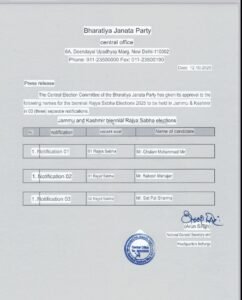Asif Iqbal Naik
Jammu, October 12, 2025 – The political landscape in Jammu and Kashmir is heating up as the Bharatiya Janata Party (BJP) has announced its candidates for the upcoming Rajya Sabha biennial elections, scheduled for October 24, 2025. The announcement sets the stage for a keen contest for the four vacant seats, where the ruling National Conference (NC)-Congress alliance holds a significant numerical advantage in the Legislative Assembly.
The BJP’s Central Election Committee has cleared the names for three separate elections being held to fill the four Rajya Sabha vacancies:

The Bharatiya Janata Party (BJP) Central Election Committee has released a press release announcing its candidates for the upcoming biennial Rajya Sabha Elections 2025 to be held in Jammu and Kashmir. The announcement, dated 12.10.2025, covers three separate notifications for vacant Rajya Sabha seats. The candidates nominated by the party are Mr. Ghulam Mohammad Mir, Mr. Rakesh Mahajan, and Mr. Sat Pal Sharma. The release was issued from the party’s central office in New Delhi and is signed by (Arun Singh), the National General Secretary and Headquarters Incharge.
The four Rajya Sabha seats have been vacant since February 2021. The Election Commission of India (ECI) has mandated three separate elections, as the vacancies fall under different biennial cycles.
Congress Candidate Selection Pending
While the BJP has made its move, the Indian National Congress (INC), an ally of the ruling National Conference, is yet to finalize and announce its candidate. The National Conference has already named three candidates: senior leaders Choudhary Muhammad Ramzan and Sajad Kichloo, and party treasurer Shammi Oberoi.
The fourth seat has been held open for a possible seat-sharing arrangement with the Congress. Key contenders from the Congress party for the potential ‘safe seat’ include former J&K Congress President Ghulam Ahmed Mir, former Minister Raman Bhalla, and former MLC Ravinder Sharma. Discussions are ongoing within the NC-Congress alliance to allocate a suitable seat to the Congress.
Detailed Voting Scenario and Quota Calculation
The Rajya Sabha election utilizes the Single Transferable Vote (STV) system, where MLAs’ votes are required to meet a specific quota. The total strength of the 90-member J&K Assembly for this election is 88 (with two seats currently vacant).
Assembly Strength Breakdown:
Party/Alliance
No. of MLAS
NC-Congress Alliance
53 (NC: 41 + Congress: 6 +
CPI(M): 1 + 5 Independents/ Others)
BJP
28
Non-aligned Opposition
Bloc
7 (PDP: 3 + PC: 1 + AAP: 1 +
2 Independents)
Required Quota of Votes for Victory:
The formula for the quota of first-preference votes (Q) for an election with M vacancies and N total votes is:
Total Votes
8= (Firmber of Vacancies +i) +1
Notification
Vacancies (M)
Total ‘
Notification 01 (One Seat)
1
88
Notification 02 (One Seat)
1
88
Notification 03 (Two Seats)
2
88
Note on Quota: For a two-seat election (Notification
03), the effective quota for election is 30 votes, which is the full integer value required to ensure two candidates can be elected by the majority group (30 × 2 = 60 < 88).
Q = (Number of Vacancies + 1) + 1
Notification
Vacancies (M)
Total 1
Notification 01 (One Seat)
1
88
Notification 02 (One Seat)
1
88
Notification 03 (Two Seats)
2
88
Note on Quota: For an election of two seats (Notification 03), the effective quota for election is 30 votes, which is sufficient to ensure two candidates can be elected from the majority side (30 votes \times 2 candidates = 60, which is less than 88 total votes).
Election Outcome Scenario
1. NC-Congress Alliance (53 Votes): The alliance possesses enough votes to comfortably win three of the four seats.
• Two Safe Seats (45+ Votes): The alliance can easily elect two candidates, one each in Notification 01 and Notification 02, by securing 45 votes for each.
• Third Seat (30 Votes): The NC-Congress can pool its remaining 53 – 45 – 8 votes (if they transfer surplus) and comfortably meet the 30-vote quota in the two-seat election (Notification 03), thereby ensuring the election of a third candidate, likely the one designated for the Congress.
2. BJP (28 Votes): The BJP, with 28 MLAs, can likely only win one seat.
• The BJP’s 28 votes are insufficient to meet the 45-vote quota for a single seat in the first two notifications.
• However, 28 votes are highly competitive for one of the two seats in Notification 03, where the quota is 30.
• To win a seat, the BJP would need to secure the votes of the smaller Non-aligned Opposition Bloc (7 MLAs) and potentially require cross-voting from the NC-Congress alliance to reach the 30-vote quota. If the alliance manages its votes efficiently and elects three candidates, the remaining votes may not be enough for the BJP to secure the second seat in Notification 03 without outside support.
The NC-Congress alliance is poised for a strong showing, but the contest for the final seat in the two-seat election is expected to be a tight battle, testing the unity of both the ruling alliance and the Opposition bloc.